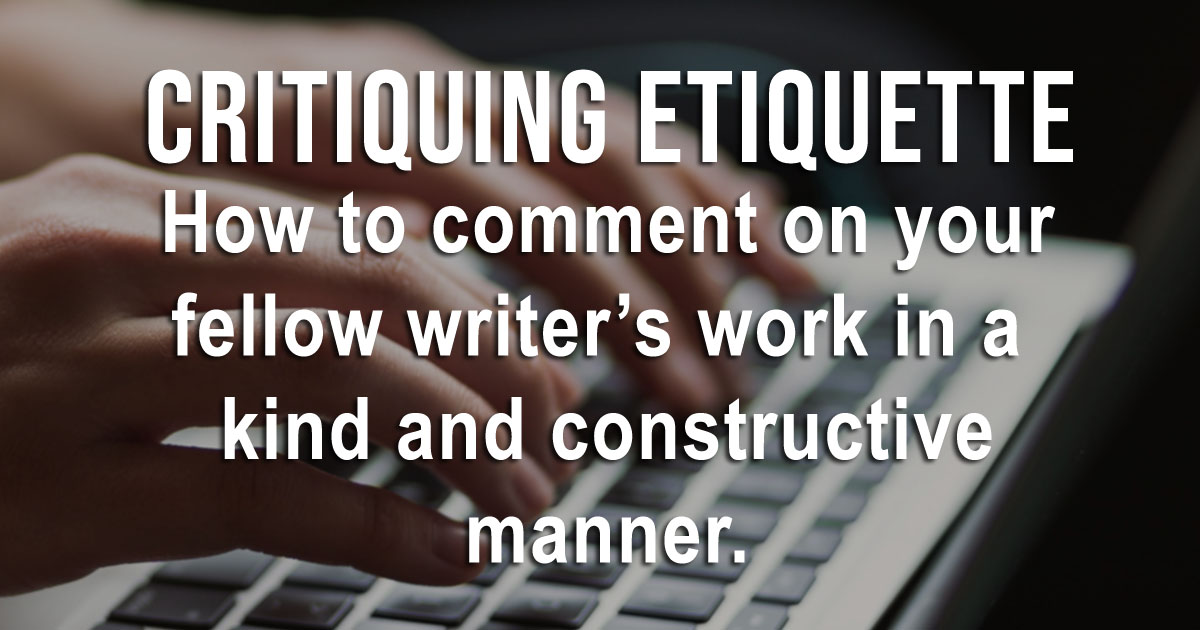To improve our writing, it is necessary to look at it critically, no matter what stage or level we are at. Allowing others to view our writing gets a different perspective on it and also enables the errors that we may have been blind to, to be found and fixed. BUT, opening our writing up to critical comments is TERRIFYING, especially for new writers, so it is imperative that those who choose to post, know what to expect and how to deal with it and those who choose to comment/critique, understand what is useful and what is not.
POSTING YOUR WORK

First things first, when you post your work on any online forum, you are inviting people to view it. If there is a commenting facility, you may find that people post comments about your writing, so, before you post your work, check out these very simple rules:
Make sure that what you post is suitable for where you are posting it. For example, don’t post poetry on a story website, don’t post on a different topic if one has been specified and don’t post adult content on a site that could have children viewing it.
In other words, use common sense and make sure your post fits where you are posting it.
If there are guidelines on how to lay out your post, follow them.
Check, double-check and check again for spelling and punctuation errors. Make sure that what you share is as good as YOU are able to get it.
Be proud of your work and yourself for having the confidence to share it.
HOW TO COMMENT IN A USEFUL MANNER
Commenting on a fellow writer’s work is not an opportunity to belittle them or point out all the mistakes they have made. This will not help them to grow as a writer and will not encourage them to share their work again.
If you really want to be useful, then please take a kind and encouraging approach.
New writers will make mistakes – often quite a lot, but pointing them all out at once can be overwhelming and confusing, so, I have found that a good approach is to first find something about their writing that is good, or that you like and tell them about it, then pick one or two key things that could be improved. As a writer improves, there will be fewer errors and you can pick up on the more technical errors in their writing.

What should you comment on?
It is good to point out punctuation and grammatical errors, but please do be sure that YOU are correct first.
You could point out where a word is used incorrectly, or the wrong tense or point of view has been used – but only if you are confident that YOU are correct.
Be careful about saying that you don’t like a writer’s style, or subject matter – this is subjective and often more about your own tastes than their skill. Personally, I think it is better not to comment on it. If other people do the same, then the writer will be able to perceive a less enthusiastic reception to their piece of writing through a lack of favourable comments, rather than a host of negative comments.
Remember the popular saying: if you can’t say anything nice, don’t say anything at all.
HOW TO RECEIVE COMMENTS AND CRITICISM
Lots of people like to be helpful and supportive and critical comments are a useful way for you to learn what works in your writing and what areas can be improved. The fact that someone has taken the time to read and comment on your work demonstrates that they value your writing, and that is a great thing.
Try not to be embarrassed if they find errors in spelling, punctuation, grammar, tense or point of view. No one is perfect and you WILL improve with experience. Make the changes, learn from it and keep writing.
If someone suggests a better way to write something, do consider what they suggest, but also remember that it is just their own opinion.
Sometimes there are nasty or unhelpful comments on forums and this can be really heart-breaking for a new writer. This is something you will need to get used to, I am sad to say BUT, do not let it stop you – take the good comments and the truly helpful comments to heart, be proud of what you are doing and most importantly, KEEP ON WRITING.
